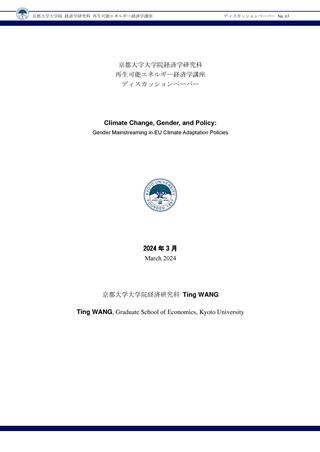TOP > ディスカッションペーパー > No.63 Climate Change, Gender, and Policy: Gender Mainstreaming in EU Climate Adaptation Policies
No.63 Climate Change, Gender, and Policy: Gender Mainstreaming in EU Climate Adaptation Policies
March 2024
Ting WANG
Ph.D. Candidate, Graduate School of Economics, Kyoto University
 As one of the greatest challenges of our time, climate change has significant impacts on various aspects of societies, ecosystems and economies. However, it is important to note that climate change has different impacts for different gender groups, which intersect with and amplify existing gender inequality. Focusing on the application of gender mainstreaming in EU climate adaptation policies (2007 to 2021), this study aims to assess the extent to which the EU has succeeded in mainstreaming gender within its climate adaptation-related policy and institutional framework. Several findings are revealed. First, there is a distinct lack of gender-related terminology in most of these policies, indicating a lack of explicit gender mainstreaming. Second, when gender is mentioned, the description tends to position women as vulnerable subjects rather than active participants in climate adaptation actions, further reinforcing traditional gender narratives and stereotypes. Third, while the existence of gender differences is recognized, there is a lack of comprehensive strategies and data to support the integration of gender perspectives into climate adaptation. Finally, gender tends to be narrowly defined as a women’s issue, with its key points shifting depending on the thematic focus of the policy, and only in the case of people-centered, social themes, gender become more prominent. In conclusion, this paper emphasizes the importance of the need for greater gender integration in EU climate adaptation policy, and gender mainstreaming should be given a more central and prioritized place in EU climate policy. It is important not only to address already existing gender differences but also to empower women and to further work on addressing systemic biases.
As one of the greatest challenges of our time, climate change has significant impacts on various aspects of societies, ecosystems and economies. However, it is important to note that climate change has different impacts for different gender groups, which intersect with and amplify existing gender inequality. Focusing on the application of gender mainstreaming in EU climate adaptation policies (2007 to 2021), this study aims to assess the extent to which the EU has succeeded in mainstreaming gender within its climate adaptation-related policy and institutional framework. Several findings are revealed. First, there is a distinct lack of gender-related terminology in most of these policies, indicating a lack of explicit gender mainstreaming. Second, when gender is mentioned, the description tends to position women as vulnerable subjects rather than active participants in climate adaptation actions, further reinforcing traditional gender narratives and stereotypes. Third, while the existence of gender differences is recognized, there is a lack of comprehensive strategies and data to support the integration of gender perspectives into climate adaptation. Finally, gender tends to be narrowly defined as a women’s issue, with its key points shifting depending on the thematic focus of the policy, and only in the case of people-centered, social themes, gender become more prominent. In conclusion, this paper emphasizes the importance of the need for greater gender integration in EU climate adaptation policy, and gender mainstreaming should be given a more central and prioritized place in EU climate policy. It is important not only to address already existing gender differences but also to empower women and to further work on addressing systemic biases.
Keywords:Climate Change; Gender Mainstreaming; European Union; Climate Adaptation Policies; Gender Disparities

